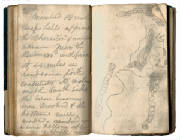Suggestions for Keeping a Journal...  ...And
for Writing in General - Use a well-bound notebook, or a blank book -- keep it in the
same place all the time. Writing on only the right side leaves the left side blank for revisions.
- Bring your notebook with you wherever you go, unless you feel compelled to -- then don't !
- It is not necessary to write every day, or at any particular
time or place. Realize there may be an ebb & flow of entries -- you can not rush ideas. Great ideas need time
to emerge and develop.
- God welcomes silence --He speaks to us in the wind and the sky and the water when we stop to listen.
- If there is something bursting inside of you and you want to record it in your journal, never discuss it with anyone
-- the entry (when you write it) will lose its power.
- Record your soul, that which
moves you.
- You may never publish any of it -- that does not matter.
- Never try to be funny or serious... Just genuine.
- Get it all down:
resist the temptation to edit initially. You can edit down, but it is more difficult to edit up (to add to the piece
and remain faithful to its integrity). Entry can be long or short -- some of your most powerful writing may be only
a sentence or two. Most of my own entries only take a few minutes to record. Be aware that if you don't get
it down you may lose it, particularly things others say.
- When writing, you will know
instinctively when to stop -- there will be no more words left to write.
- Every person
has something to write about -- look at your life, your greatest concerns, feelings, thoughts. Your work, home, family,
neighborhood, church -- lives you are intertwined with.
- RETURN to your piece, your
journal entries, and EDIT. What you have written may be turned into poems, essays, stories, or simply left alone.
- You only get better by writing. The more the better. Remember, no-one else has to see it. This
is very important -- you need that freedom.
- Resist the temptation to compare your writing
to other authors -- this splits your concentration and can paralyze you. As a result, you will never write the best
you are capable of. There is only one person you should compare your progress to -- and that is you.
Remember, the only rule of
keeping a journal, of writing, is: THERE ARE NO RULES, only your own, and you can break them at any time. *** *** *** ***

Starting a journal was important. I had to be able to go somewhere where it
was safe even if no one else saw my words. I was very depressed. I had to be able put down my feelings and thoughts.
It was an important first step toward becoming more articulate. I knew my emotions back then were frozen. Some
years went by. I continued my journals. At some point I made a switch: I started writing about "the positive"
instead of just the negative, although I would have not gotten there if I had not started writing my depressed thoughts first. Siggy
|



